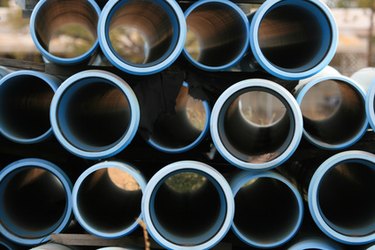
Septic tank leach fields evolved out of the need to safely handle sewage in places where no community sewage systems were available. Varying soil conditions drove the development of the different styles of leach fields. Soil samples and percolation tests determine which sewage disposal system is best for a site.
Pipe and Gravel
Video of the Day
This style of septic tank leach field is very common and many of these are installed across the country. The effluent leaves the septic tank and either goes directly into a leach field with one perforated pipe, or it enters a distribution box so it can be split out to two or more pipes. The perforated pipes sit on top of 6 inches of uniformly round stones and the stone is extended to the their tops. Filter fabric goes over the top of everything and then soil is backfilled until the trench is level.
Video of the Day
Substitute Aggregate
In one variation of this, plastic beads encased in netting replace the gravel in a pipe and gravel leach field. Another style uses filter fabric separated by plastic spacers. Crushed glass and ground-up rubber tires may also act as suitable substitutes for aggregates.
Chambers
You fasten these plastic domes together to form one continuous chamber and the effluent from the septic tank flows into it. These chambers may be placed in multiple trenches with a distribution box directing the flows evenly to them. Soil is backfilled directly against the chambers. The advantage to these is the amount of unobstructed percolation space they create. This makes them well suited to soils that do not drain quickly.
Gravelless Pipe
Installers set these corrugated pipes in a trench the same as the pipe and gravel systems but there is no gravel added. They might use a single large-diameter pipe, or an array of smaller pipes laid side by side. Filter fabric encases the pipes before the trench is backfilled.
Mounds
Use mound leach fields where the soil is shallow and where there are high water tables. You have to bring in special sand to create the system since the soil on site is already marginal for treating the septic tank effluent. Once a layer of sand is placed over the existing soil that has been plowed, build a pipe and gravel system on top.
Pressurized Dosing
A pump delivers the effluent to the pipe and gravel leach field in intervals. The pump pressurizes the pipes and forces the effluent through them. The advantage is a more even distribution of the effluent in the field and drying out periods between charges. The disadvantage is the possibility of the pump breaking down and the system backing up before anyone knows.